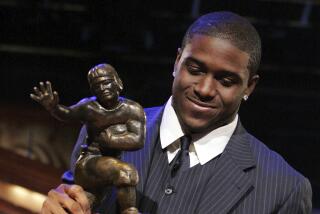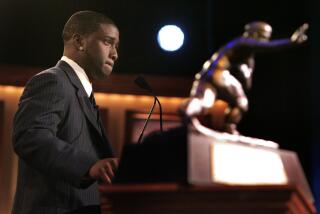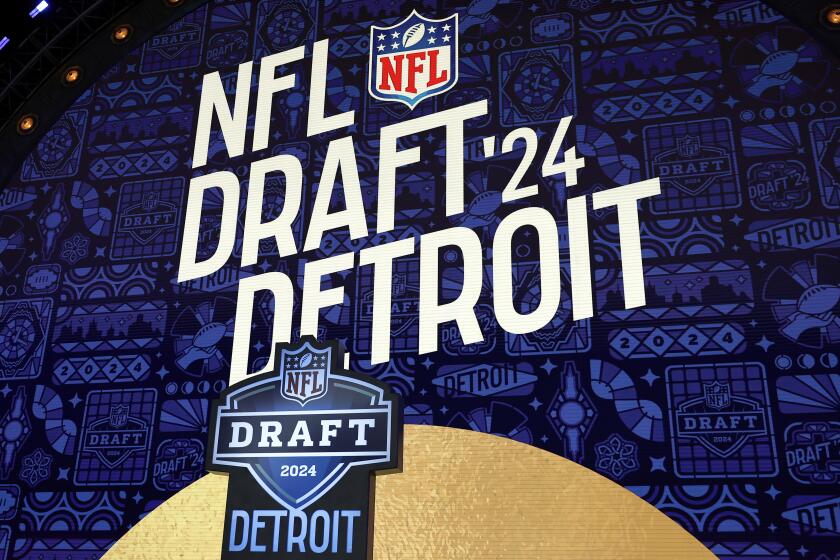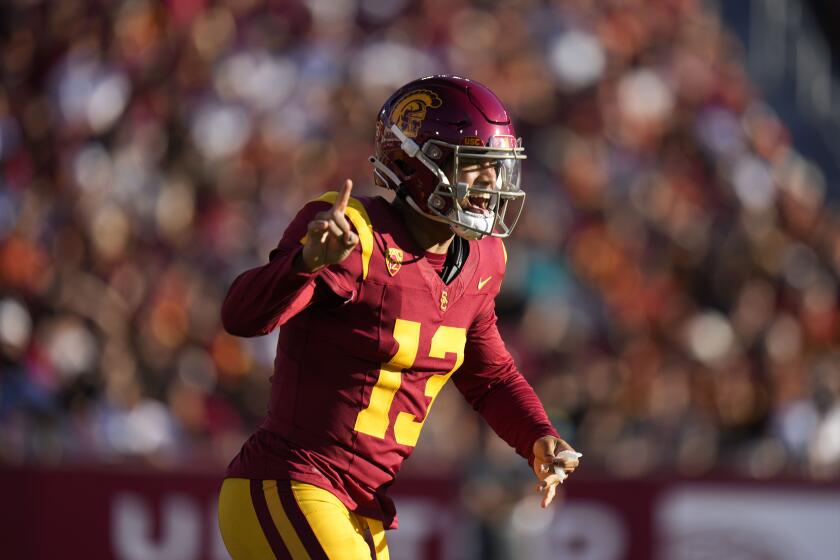Newest 49er Weapon
The San Francisco 49ers’ new leader, Tim Rattay, in his second NFL start, continued as a big-play quarterback Monday night with possibly the 49ers’ longest-ever series of well-placed long and short passes except for some of John Brodie’s long ago.
To be sure, as critics said after Rattay’s first start two weeks back when he lifted up the then 3-5 49ers, he hasn’t been hit yet. Quarterbacks who have are different from those who haven’t, more skittish, less poised. Still, Rattay is starting out as a big-pass wonder.
The Pittsburgh Steelers, who fell, 30-14, are a passing team now too.
And their passer, Tommy Maddox, kept them in the game for awhile.
But the Steelers have only been airing it out in this century. Through the 1990s, as coached by an old conservative, Bill Cowher, they were a traditional run-the-ball-stop-the-run team — playing a role they have famously played going back to their Super Bowl days and before. They looked like a passing team that doesn’t practice passing enough, doesn’t quite get the hang.
The 49ers by contrast converted to passing under their 1980s coach, Bill Walsh, and seemed accordingly much more polished, particularly with Rattay, whose six misses on a 21-for-27 passing night were mostly all throwaways. He’s now played two big games, two for two. The 49ers, maybe, are coming.
New Passer Is a New Kind of 49er
49ER POSTSCRIPT: The West Coast offense, which has spread from the 49ers to much of football, college and pro, began with Bill Walsh’s first quarterback in 1981, Joe Montana. At the time, Walsh was a full-service passing coach who tailored his repertoire to the short-pass West Coast system because Montana was more comfortable and more accurate throwing short than long.
Though Walsh’s next quarterback, Steve Young, was a good long passer, the 49ers continued in the West Coast because it worked so successfully under offensive coordinators like Mike Shanahan, who went on to win two Super Bowls at Denver. The 49ers’ most recent quarterback, Jeff Garcia, now injured, is a West Coast type like Montana, meaning that he can effectively play ball-control football with short passes.
Tim Rattay is something new in San Francisco, a bomber, potentially, with a knack for throwing long passes on target and on time, with some touch, though he rises only about six feet, and scales no more than 200. Nor has he been hit yet.
Cowboys vs. Carolina: It’s a Big One
THE 7-3 DALLAS COWBOYS, who will be home to 8-2 Carolina next Sunday in the Game of the Week, restricted hard-driving New England to a single touchdown in Sunday night’s Week 11 headliner — on the Patriots’ field.
Though in the end Dallas was blanked, 12-0, young quarterback Quincy Carter held his own in yards gained passing with the Patriots’ Super Bowl quarterback, Tom Brady. And on defense, the Cowboys were similarly stout. Statistically, they excelled the 8-2 Patriots.
This suggests that in the Cowboys’ collision with Carolina, they’ll be a handful.
It will hardly be an upset, though, if Dallas loses again in another close game.
One way to look at the Carolina Panthers is to count their wins over good teams this year. They were the first to expose Tampa Bay. They surprised New Orleans. They won at Indianapolis. They proved they could beat New Orleans twice — and Tampa twice — and the truth is that slumping Tampa would be leading the division if it had only won from Carolina.
Quarterback Jake Delhomme has made the Panthers a sound, well-balanced team. In the media Age of Personalities, his running back, Stephen Davis, got the final touchdown and the credit for edging Washington this week, 20-17, but Delhomme’s 317 passing yards won the game.
Nine Kansas City Wins Monumental
THE KANSAS CITY CHIEFS’ setback Sunday wasn’t a momentous happening. In pro football’s Age of Parity, it had to happen someday. The momentous thing was their season-opening nine-game winning streak going into Cincinnati, where new coach Marvin Lewis has improved the 5-5 Bengals so rapidly that after a 1-4 start, they’re now the leading candidate for best in the NFC South.
Coach Dick Vermeil’s feat — taking the Chiefs to nine wins in a row — should be accepted for what it was: an extraordinary achievement in an era of sweeping parity.
The 1972 Miami Dolphins, the NFL’s lone unbeaten team (14-0), had a much, much easier time of it in their year. For one thing, they played a shorter schedule. For another, there was no league concern for parity in those days, when the ’72 Dolphins played a lot of stiffs. Most important, the early 1970s were a one-dimension era with little passing.
On the Los Angeles afternoon when the ’72 Dolphins won the Super Bowl, they completed only eight (eight!) passes. They attempted but 11 (eleven!). When they won the Super Bowl again a year later, they attempted seven passes, completing six.
You can’t win that way now. Since the 1980s when 49er Coach Walsh opened up the game, this has increasingly become a passing league. If you think Lewis has a nothing team in Cincinnati, well, a nothing team today can still throw bombs.
And it was a well-aimed bomb — Jon Kitna’s long, long fourth-quarter pass on a 77-yard touchdown play — that brought down the Chiefs, 24-19. Nothing remotely like that happened to the ’72 Dolphins. Or could have happened.
Bengals’ Lewis Really Has a Nerve
BENGAL POSTSCRIPT: The Cincinnati leader, Lewis, toppled Kansas City with precisely the kind of winning football never seen by the 1972 Dolphins or their peers — attack football. After the Chiefs drew close to him in the fourth quarter, 17-13, Lewis, theoretically, could have retreated into a shell and tried to just hang on to his four-point lead. Instead, Lewis attacked.
Even though, this year, he lacks one of the marquee quarterbacks, who in pro ball are numerous now, Lewis ordered up Kitna’s last long touchdown throw to Peter Warrick, one of the nation’s many talented wide receivers. This is a season that has shown up several NFL coaches who lack the nerve to do that. The difference in 1972 wasn’t lack of nerve. It was lack of talent.
The Return of a Denver Plummer
THE DENVER BRONCOS don’t have a great deal to beat next Sunday, some are insisting, when the Chicago Bears come in. Yet with the return of quarterback Jake Plummer from foot-injury problems, Denver has reestablished itself as, I’d say, the best team in football.
It isn’t that the Broncos walloped San Diego last Sunday, 37-8, it’s the way they did it — with one of the league’s most effective two-way threats as represented by Plummer and running back Clinton Portis. The bag of 106 rushing yards by Portis helped set up Plummer’s three touchdown passes to tight end Shannon Sharpe.
Plummer has missed so many games that the Broncos, after losing most of them, probably can’t catch Kansas City in the race for first in the West. But if they make the playoffs as a wild-card team, watch out.
As for the Chargers, they were unfortunate that the luck of the schedule carried them to Denver at just this time. For, after showing his hand last week when he surprised Minnesota, 42-28, quarterback Doug Flutie couldn’t sneak up on Denver. Nor could his teammates make the required pass-protection blocks against the suddenly alerted Broncos. Nor did San Diego really have a chance against a team fired up by Plummer’s return.
One San Diego play told it all for Flutie. When at the Denver 20 he was going in for what could have been a difference-making touchdown in the second quarter, Flutie’s pass for a first down hit tight end Stephen Alexander in the stomach but was dropped, and not only that, Alexander dropped it into Kelly Herndon’s hands for a Bronco interception. This wasn’t meant to be a Flutie day.
With Broken Thumb, Favre Fires
THE GREEN BAY PACKERS (5-5) are back in what has become the NFL’s weirdest division-title race. They’re in it with the Minnesota Vikings (6-4), who, after starting the season 6-0, are 0-4 in their last four. The Vikings can’t win — and Green Bay can’t pass.
Green Bay quarterback Brett Favre’s broken thumb restricted him Sunday when the Packers won, 20-13, by running through the Tampa Bay Buccaneers as if they weren’t there.
Nothing heals a broken thumb but rest. And Favre won’t rest. And nothing heals a losing streak but winning. And the Vikings can’t win, even in Oakland, where the Raiders somehow held on to prevail Sunday, 28-18, though Minnesota, punting only once, piled up 467 total yards.
Were the Packers in a tougher division than the NFC North, where Minnesota, Chicago and Detroit have all experienced years of trouble and turmoil, they would have to do something each week besides sending Favre forth to win while reinjuring his right thumb.
Hardly anything is more important to a right-handed passer than a right thumb. You can’t launch good passes without a good right thumb. But Favre does. You surely can’t win without one, but Favre does that too.
He’s a classic example of how pro football players play hurt. Most make millions playing a game, true, but starting with the first scrimmage each summer in training camp, they all hurt, more or less consistently, for up to six months, so long as the games last — or they last. Some just hurt worse than others, and Favre is one of those.
One Good Call by Rams’ Martz
THE ST. LOUIS RAMS and Seattle Seahawks are locked in one of the NFL’s closest division-title races — there are five such races altogether this year in a parity-driven eight-division league — but the Rams may have a slight edge over Seattle in the next three weeks before they meet again at St. Louis Dec. 4.
The Rams are at Arizona, at Cleveland on a Monday night and play Minnesota in their next three when the Seahawks are at Baltimore, at Minnesota and play Cleveland.
In Chicago last week, the Rams seemed a certain loser, by at least 14-3, right up until four minutes before the onset of the fourth quarter. At that late hour, their coach, Mike Martz, made one of his few good calls of a game in which he had spent much of the day sending running back Marshall Faulk hurtling into a big, immovable Bear line on early-count power plays — on first down, that is, and often on second.
Faulk isn’t a power-running back, having proved that for years. Nonetheless, Martz kept stubbornly trying to disprove it until late in the third quarter, when it wasn’t first down, it was fourth and one foot when Martz again called for Faulk. You’ve seen other NFL running backs going for a first down on fourth and very short and sometimes making it. More often, you’ve seen NFL defensive teams stop fourth-down runs by massing nine (or eight or 10) defensive players along the line of scrimmage.
The trouble with such a defensive tactic (which the Bears, of course, adopted in this crisis) is that if the ballcarrier gets one good block and slides through the defensive line — as Faulk did on this play when 325-pound offensive tackle Orlando Pace escorted him through — there are no opponents in the second line of defense. Finding himself suddenly in an open field, Faulk had nothing to do but run until he was caught. And after 52 yards, he was caught, and went right down.
One good call, reminiscent of the days when Martz was the NFL’s great signal-caller, had changed the game, placing the Rams where they couldn’t get before, close enough to score.
Ram quarterback Marc Bulger, reprieved after spending his day making like an amateur gunslinger who can’t shoot straight, suddenly began firing with reasonable accuracy. And before the game was four minutes into the fourth quarter, the Rams had charged to the front, 17-14, on two four-yard touchdown passes, Bulger to wide receiver Torry Holt and then to tight end Brandon Manumaleuna.
What with one thing and another, it was a comical game. Like Martz, Chicago’s coaches had put in their afternoon trying to run the ball, as they always do. With running back Anthony Thomas, they had been running it better than Faulk could — until Pace blocked Faulk into an open field — but you don’t beat good teams running the ball in this league, as the Bears relearn almost every Sunday (except they never actually learn).
For Thomas has one glaring weakness. He’s a running back, so he can’t produce in catchup mode.
To catch up with good players who hold a second-half lead, what you need is a pass offense. So after the Rams had moved ahead by three points in the fourth quarter, the Bears, with no other options, unleashed their own very good passer, Chris Chandler.
And on only three plays — all pass plays— Chandler went 60 yards to regain control for Chicago, 21-20.
Now if the Rams were to come back, it was up to Bulger again, and in the last two minutes, as Martz remembered to send in some pass plays, Bulger paraded the Rams from their 20 to a platform inside the Bear 20, where a field goal ended it all, 23-21.
Warner Advises Rams to Use Bulger
RAM POSTSCRIPT: According to the St. Louis Post-Dispatch, when Bulger was struggling in the first three quarters Sunday — throwing the ball nearly everywhere but into the hands of Ram receivers — Ram Coach Martz conversed with his second-string quarterback, Kurt Warner, who used to be first string. The newspaper reported the dialogue:
Martz to Warner: Are you ready to go in?
Warner to Martz: Don’t do that to Marc. Let him fight his way through this.
Beyond all doubt, Warner wanted to be on the field. He had his hat on for awhile, and he looked ready for some football. But Warner also knows that nobody can play quarterback well in the NFL if he’s afraid of being replaced for whatever reason.
Bulger has had a difficult season, particularly in recent games when — after showing last year that he couldn’t throw the ball any way but straight — he has dispatched a spread of inaccurate passes. He has seemed tentative, tense, dispirited. Thus if he now turns around his career, and keeps it turned, he will owe it all to Warner, the man who wants nothing more in this life than to be the Ram quarterback himself.
Bob Oates’ book, Sixty Years of Winners, is available at latimes.com/bookstore or by calling (800) 246-4042 ($16.95).
More to Read
Get our high school sports newsletter
Prep Rally is devoted to the SoCal high school sports experience, bringing you scores, stories and a behind-the-scenes look at what makes prep sports so popular.
You may occasionally receive promotional content from the Los Angeles Times.






